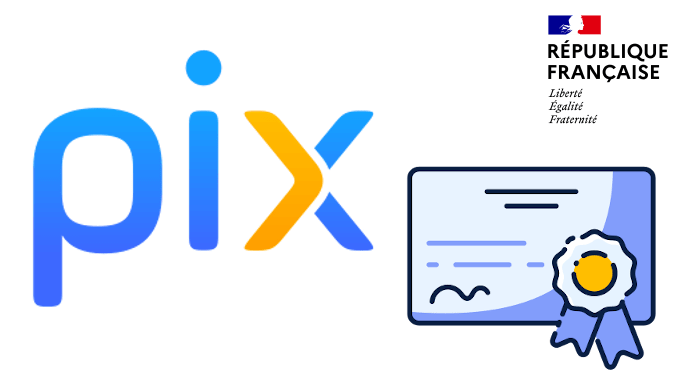Certificat de compétences numériques (PIX)

PIX à la faculté des sciences de l’université de Montpellier
Depuis la rentrée 2019-2020, la certification Pix est intégrée en tant qu’élément pédagogique dans une UE de culture générale, du premier ou du second semestre (HA1G10H & HA2G12H respectivement (4ects), 40 places par UE maximum, premier inscrit premier servi, pas d’extension possible de groupe)
Pour certains parcours la formation et/ou l’obtention de la certification Pix est obligatoire :
- PEIP-bio :Formation et certification Pix obligatoire pour l’obtention du diplôme (HA2G12HY : inscription et passage en L1S2)
- CMI : Formation et certification Pix obligatoire pour l’obtention du diplôme (HAI509I, inscription et passage se renseigner auprès de la responsable des CMI)
- Bio-MV : Formation obligatoire, mais obtention de la certification Pix non obligatoire. Le suivi de la formation de l’UE HAV404V (S3-Pix) est un pré-requis pour l’UE de Bioinfo HAV404V. Cette UE de bioinfo est obligatoire en L2S4 pour les étudiants en licence « science de la vie » Bio-MV (PCAV, LAS, Bio-ME). La note obtenue au premier semestre est prise en compte comme CC3 au second semestre dans l’UE HAV404V (S4:bioinfo).
Les grandes étapes
Pré-requis pour ces UEs :
=> D’un ordinateur (Clavier + souris). Les tablettes et téléphones ne sont pas adaptés. Vous pouvez utiliser les ordinateurs de la faculté des sciences, dans la salle du bâtiment 36 (36.209). Le planning de mise à disposition de cette salle est affiché sur la porte.
=> Vous devez installer des logiciels gratuits et n’utiliser que ceux-ci, à la fois pour vous exercer et pour passer la certification
=> Aucun niveau de base n’est nécessaire, vous allez l’acquérir
L’évaluation :
=> Il y aura 2 contrôles continus (non présentiel – travail individuel et autonome à la maison ≈ 25h) sur des compétences numériques spécifiques de Pix.
Ces devoirs sont obligatoires et font partis de la note finale pour l’UE. Ils doivent être terminés et rendus à une date précise
=> Il y aura 1 examen final : test de positionnement(non présentiel – travail individuel et autonome à la maison ≈ 25h) sur l’ensemble des 16 compétences numériques de Pix.
Ce test est obligatoire.
Il doit être terminé et rendu à une date précise :
Ce positionnement indique à l’étudiant son niveau atteint (de 1 à 7) dans chaque compétence numérique ainsi que le nombre de points acquis. Pour pouvoir être inscrit à passer la certification pix vous devrez atteindre, au moins, le niveau 4, pour chacune des compétences.
Cet examen final, peut-être repassé autant de fois que nécessaire pour atteindre le score de 4, avant l’envoie des résultats. La limite de temps étant dépendante de la date de rendus fixée. L’étudiant peut ainsi améliorer son score de départ et mesurer les progrès réalisés et envoyer ses résultats quand il le veut, avant la date butoir.
=> Rattrapage : Passage de la Certification pix(Présentiel – Test sur ordinateur durée 1h45 – ce sera la note de rattrapage)
À la fin de chaque semestre, durant les semaines d’évaluation, l’étudiant se présente obligatoirement au test de certification, organisé par la FDS ou la responsable de l’UE. Il validera ainsi les compétences numériques acquises en référence au dernier test de positionnement qu’il aura réalisé.
L’étudiant ne pourra se présenter à la certification qu’à condition d’avoir effectué au préalable le test de positionnement, en avoir transmis le résultat à la responsable et avoir atteint le niveau 4 à chaque compétence.
La certification pix sera délivrée à l’étudiant après délibération du jury national, sous format numérique directement sur le compte Pix de l’étudiant.
=> Conjointement à la procédure nationale, les UE HA1G10H & HA2G12H proposent une formation en présentiel sous forme de TD(3h)/TP(6h) aux étudiants, pour une meilleure réussite à cette certification.
Toutefois, l’évaluation pour ces UE est la même et est basée sur 3 scores obtenus sur la plateforme d’évaluation pix à transmettre au responsable des UE :
– CC1: Test les compétences Pix suivantes (Travail personnel à la maison ≈15h)
Compétence Pix 1.3 : Traiter des données
Compétence Pix 2.3 : Collaborer
Compétence Pix 3.1 : Développer des documents textuels
– CC2: Test les compétences pix suivantes (Travail personnel à la maison ≈15h)
Compétences Pix 3.2 : Développer des documents multimédias
Compétences Pix 3.3 : Adapter les documents à leur finalité
Compétences pix 3.4 : Programmer
– Examen final : Test les 16 compétences de la plateforme pix (Travail personnel à la maison ≈15h).
– Note de rattrapage : Note obtenue à l’examen de la certification PIX
La certification :
La certification se passe uniquement en présentiel sur le campus de la FDS.
Elle dure 1h45 et vous aurez 32 questions.
Pour obtenir la certification, il faut répondre à 20 questions. En fonction de vos réponses la difficulté des questions s’adapte et vous pourrez ainsi obtenir une évaluation de votre niveau pour les 16 compétences.